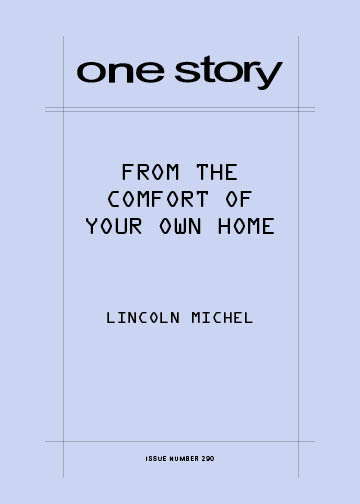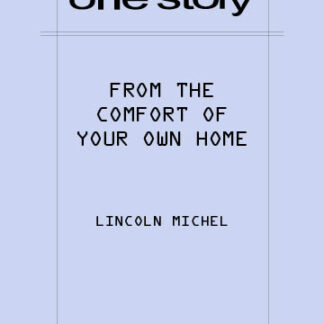
From the Comfort of Your Own Home
$2.50
99 in stock
Excerpt
MindFood Username or Email Address: Stella.O.Writer
Subject (select one): *Problem with Service*
Applications Used (select as many as apply):
* Virtual Room with a View – Literature
* Secret Grove Enhanced Yoga Retreat
Summary of Issue (max 400 characters): I’m requesting a refund for your “virtual reality writing retreat.” While I was impressed by the tech (goggles were ergonomic, gloves comfortable, haptics responsive) and mechanics (setting was realistic, flora well-rendered), I was harassed, haunted, and had my work destroyed inside your virtual cabin. Plz refund ASAP. I am now novel-less and behind on student loan payments.
Details of Issue with Service (please be as thorough as possible so we may adequately assist you): Compose in text box below or else attach a .pdf, .doc, or .docx file.
I should start with my apartment. It’s not a peaceful place. I live with two strangers I split utilities with, Jared and Amanda, and an elevated subway line rattles right past our kitchen window. The walls are cardboard and there’s a roach nest hidden somewhere behind the fridge. So, you’ll understand why a virtual reality writing residency appealed to me.
Lincoln Michel
Lincoln Michel’s debut novel The Body Scout (Orbit) was named one of the ten best science fiction and fantasy books of 2021 by The New York Times. He is also the author of the story collection Upright Beasts (Coffee House Press) and the co-editor of the anthologies Tiny Crimes (Catapult) and Tiny Nightmares (Catapult). His fiction appears in The Paris Review, Granta, NOON, Lightspeed, the Pushcart Prize anthology, and elsewhere. You can find him online at lincolnmichel.com and @thelincoln.
Patrick Ryan on “From the Comfort of Your Own Home”
Stella is a writer without much time to write. She also lacks privacy and a decent place to write in. One possible solution? How about a virtual reality artists’ residency? The idea of such a residency sounds promising, in theory, but the reality of it (yes, the reality of the virtual reality) is far from ideal. In fact, things go so wrong for Stella that she decides to lodge a complaint with the company. And that complaint forms our new issue.
Anyone familiar with the work of Lincoln Michel knows that he’s more interested in exploring the far-out possibilities of the short story form than he is in following a set of traditional writing rules. One Story readers can now reap the benefits of that approach in “From the Comfort of Your Own Home.”
One of my favorite Emerson quotes, from “Self-Reliance,” is, “My giant goes with me wherever I go.” Emerson was talking about travel—the idea of traveling to get away from the circumstances of one’s life and soul, and finding that to be impossible. Lincoln Michel has 2.0’d that notion, and the result is a very funny story that’s also a little bit scary. We hope you enjoy it.
Q&A by Patrick Ryan
- PR: Where did you get the idea for this story?
- LM: For a while, I’ve been working on a series of stories about struggling millennial types in NYC—the stories are, I hope, a lot more interesting than that summary sounds!—which are largely set in dingy apartments. So I’ve been thinking a lot about the claustrophobia of city living, the weirdness of having roommates well into adulthood, rotten landlords, etc. At some point, the idea of a virtual reality writing residency came to me. The story spilled out from there. All the stories stand alone, but for the one or two people reading this who are interested in the Lincoln Michel Expanded Short Story Universe, the character Amanda is the main character in my Granta story “The Smart House of Mrs O” and the briefly mentioned Felix is the narrator of my Paris Review story “A Feeling Artist.” Another inspiration was simply thinking about the banal uses of virtual reality. Normally, we think of video games. And in cyberpunk type stories, virtual reality is a land of hacking, viruses, and virtual battles to the death. That stuff’s quite fun, of course. But the more virtual reality becomes a part of our daily lives, the more it will be used for mundane activities. There was something both funny and potent to me about the idea of VR being used to simulate things like meditation, yoga retreats, and writing residences that are, in theory, all about disconnecting us from technology. But then we already live in a world where millions use meditation apps and yoga programs, so why not arts residencies?
- PR: How long did it take you to finish a draft you were happy with?
- LM: I’m the kind of writer who jumps around between lots of projects—and in this case I worked on the story between rounds of revisions on my debut novel, The Body Scout—so I’m not sure exactly how long it took. One thing I do know is that I finished the first draft in January of 2020, a couple of months before COVID hit. (Checking my files, I see it was initially titled “Residency 2.0,” which is a bit dull.) So when I first wrote the story, it was speculative fiction, yet as I revised, it increasingly became a realist one. Some writing residencies actually did move to virtual (Zoom) versions during the first year of this seemingly unending pandemic. And then late last year Meta (née Facebook) came out with their dreary Playmobil aesthetic virtual reality office simulator that was a good example of the mundane virtual reality uses I was thinking about. It’s a strange age to be a science fiction writer. Very hard to stay ahead of reality in these surreal times…
- PR: Writing fiction about fiction writers is always risky I find—especially if the tension is primarily, Will this character be able to write? You avoid that by setting the story in a virtual writing retreat that’s been hacked by an invading force. Still, you’ve taken quite a risk here. Was there any hesitation about the subject matter on your part? Or did you dive in fearlessly?
- LM: I have to confess I’ve never fully understood the prohibition against writing about writers. It seems like a uniquely fiction writer concern. Poets constantly write poems about poetry, countless Hollywood movies are about filmmaking and acting, etc. The advice I was always given was to channel your feelings about writing into a different art form. Make your main character an actor or a photographer or a sculptor. This is supposed to add “distance” to your work, which is then supposed to…do something. I was never quite clear. I enjoy reading (and sometimes writing) about other art forms, but I see no reason why writing should be off limits in fiction. Any reader annoyed by a struggling novelist probably isn’t going to be fascinated by a struggling sign painter or food photographer either. As I’m typing this answer, I realize I actually poke fun at this conventional wisdom in the story itself, complete with scare quotes: I’d reached a critical moment in my novel, the point when the protagonist—a young man struggling as a screenwriter in Los Angeles (basically me with a few tweaks to add “distance” to my work)—had to make a terrible choice that would reveal his true character to the reader and himself. Something scratched at the door.
- PR: I love that you were making the point in the interview before you remembered making it in the story. “From the Comfort of Your Own Home” largely takes place within a virtual world that’s both funny and flawed. As I read it, I felt like I could picture Stella’s virtual world just as clearly as I could her real world—so hats off to you for that. Were there any great ideas you had for the virtual writing retreat that you had to let go of? (Are there whole sections of this story on the cutting room floor?)
- LM: Thank you! I’ll tell my parents, “See, my years of playing computer games as a kid did have a use!” I don’t think there was too much about the virtual reality residency itself that got left on the cutting room floor. The story did inspire some other ideas about virtual reality that might work their way into future stories someday.
- PR: Can you talk a little about the form? Was it always your intention to write the story as a customer service complaint, or did you decide that after you started working with the material? What challenges, if any, did the form bring?
- LM: I have a personal theory of writing that any aspect of fiction can “drive” a story, so to speak. Often stories are divided into a binary of “character-driven” stories and “plot-driven” stories—which is wrapped up in a bunch of biases about literary and genre, highbrow and lowbrow. I dislike the binary. I think many stories are “atmosphere-driven” or “style-driven” or “form-driven.” And all of these are just as valid and can produce interesting work. A corollary to this theory is that most writers tend toward one or two aspects. They work best when X or Y is behind the wheel. Personally, I’m driven by idea and form. At least in short fiction. I get my idea first—here, virtual reality writing residency—but then I can’t actually get started until I figure out the form or the shape of the story. Is it going to be a series of chronological vignettes? A braided POV narrative? In the form of emails or diary entries? So that’s a long way of saying that the story was always in the form of a customer service complaint letter. That’s how it came to me. I think the challenges—and the fun—of a story in a familiar textual form like a complaint letter is figuring out the balance of honoring the form and subverting it. How do you fit the form yet also provide a satisfying narrative? To me this kind of challenge is a generative one. The form itself generates ideas for me, so it’s as much freeing as it is challenging.
- PR: What are you working on now?
- LM: In addition to the interconnected stories I mentioned, I’ve been working on a new novel. I probably shouldn’t talk about it until it’s truly done, but my short pitch is “Pale Fire meets Star Trek.”
- PR: What’s the best piece of writing advice you’ve ever received?
- LM: To tie this answer into some of the other questions, I think the best advice is to have fun writing. Play around with different forms. Try odd concepts and test out weird ideas. Write about writers or anything else that strikes you. Ignore the so-called rules. Fiction is an infinite landscape. And short fiction especially is an ideal field to run through, building whatever strange structures come into your head.
